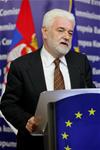New government, old priorities
Dessislava Dimitrova, March 20, 2011
 “An operation done with threads instead of a laser” – that is how the recent changes in the government of Serbia are described by some. The cabinet reshuffle has been approved late on Monday following week-long debates. Why the debates took a whole week since the changes were endorsed unanimously? Probably for the same reason why there is a “new” government in Serbia, but in deed it is led by the same Prime Minister, consists mostly of the same ministers, and, as old-new Prime Minister Mirko Cvetkovic made it clear in his speech to the members of parliament, has the same priorities as in 2008 when he took office.
“An operation done with threads instead of a laser” – that is how the recent changes in the government of Serbia are described by some. The cabinet reshuffle has been approved late on Monday following week-long debates. Why the debates took a whole week since the changes were endorsed unanimously? Probably for the same reason why there is a “new” government in Serbia, but in deed it is led by the same Prime Minister, consists mostly of the same ministers, and, as old-new Prime Minister Mirko Cvetkovic made it clear in his speech to the members of parliament, has the same priorities as in 2008 when he took office.
“The priorities, on the basis of which the government was formed in July 2008, of course, remain unchanged,” Cvetkovic said. They are: Serbia to join the European union as fast as possible, keeping Kosovo as part of Serbia, economic development, fight against crime and corruption, full cooperation with the International Crime Tribunal for former Yugoslavia (ICTY), he recalled what was already promised three years ago.
The only difference with the 2008 promises is that back then the country’s EU integration was not just set as a priority, but this goal was bound with a timeframe: “The government’s goal is by accelerating economic and other reforms the country to receive a candidate status by the end of the this or the beginning of next year.”
Now there are no timeframes set, as the overall expectations are this to happen by the end of the year. According to Cvetkovic, as a result of the reforms carried out in the country, by the end of the year rule of law will be fully implemented and there will be an effectively working economy, which will bring the country closer to EU standards. The end of the year was not chosen as a deadline by accident. Serbia is facing general elections next year and will be able by then to rely on the Prime Ministers’ promises (who, by the way has again become a finance minister).
Back in the 1980s Cvetkovic was an external consultant on World Bank projects in Pakistan, India and Turkey and also worked for the United Nations Development Programme (UNDP) in Somalia. His political career began in the government of late Zoran Djindjic, where he was a deputy economy and privatisation minister. Between 2003 and 2004 he headed the country’s Privatisation agency and when Vojislav Kostunica stepped into office as a Prime Minister, he withdrew from politics to work as a consultant. Cvetkovic became a finance minister in Kostunica’s second government in 2004.
When last month he sacked the deputy prime minister in charge of the economy, Mladjan Dinkic (which led to more resignations in the cabinet and unleashed the government reshuffle), Cvetkovic pledged harder work in order to cut unemployment, encourage industrial production and tame inflation. When speaking in Parliament late on Monday (March 14), he promised again that by the end of its mandate, the government will, via series of measures, raise employment and improve the living standard in the country as a whole.
Which is actually the other distinction between the new and the old promises. As Milan Cilbruk, editor-in-chief of the Serbian business monthly Ekonomist wrote “in any case the new Prime Minister, now also serving as a Finance Minister, will not be able to rely on another 100 days of patience from the society”. Nobody will have so much patience as the situation has become critical, he says and adds: “Serbia’s problem, by the way, is that the time for talks is over. Instead, the ministers will have to start working and sweat a bit until they find an exit of this strait situation. And then it will be difficult to believe that it was journalists’ fault for everything. They just make noise. As if anything else is OK.”
 Bakir Izetbegovic, Andrej Plenkovic | © Council of the EU
Bakir Izetbegovic, Andrej Plenkovic | © Council of the EU Aleksandar Vucic, Recep Tayyip Erdogan | © Serbian Presidency
Aleksandar Vucic, Recep Tayyip Erdogan | © Serbian Presidency Jean-Claude Juncker, Zoran Zaev | © European Commission
Jean-Claude Juncker, Zoran Zaev | © European Commission